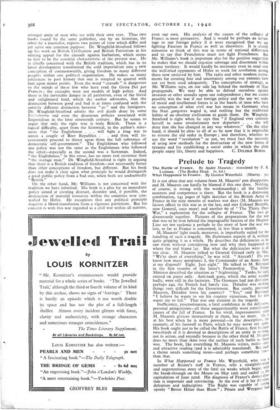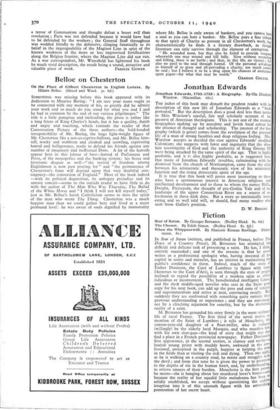Prelude to Tragedy
The Battle of France. By Andre Maurois : translated by F. R. Ludman. (The Bodley Head. 7s. 6d.)
What Happened to France. By Gordon Waterfield. (Murray. 5s.)
IT is not often that any volume from M. Maurois' pen disappoints, and M. Maurois can hardly be blamed if this one does. Nothing, of course, is wrong with the workmanship • all the familiar neatness and competence is there. But the book is a distressing combination, 145 pages of light sketches of the British Army in France in the nine months of warless war days (M. Maurois was liaison officer in this war as in the last, and met Colonel Bramble, now General, once more) and another 6o of " The Thirty Days War," a euphemism for the collapse of France. The two go disastrously together. Pictures of the preparations for the war that was to be won behind the impregnable bastion of the Maginot Line are too sardonic a prelude to the story of how the war was lost, so far as France is concerned, in less than a month. M. Maurois' light touch, moreover, is imperfectly suited for the handling of such a tragedy. He illuminates aspects of it, without quite gripping it as a whole. He describes the deficiencies as he saw them without considering how and why they happened or where the real blame lay. But what the deficiencies were is all too clear. M. Maurois talked to General Giraud early in May. " We're short of everything," he was told. " Aircraft! Do you know how many aeroplanes I, the Commander of an Army, have at my disposal? Eight. Just eight." He talked to M. Reynaud in the first months of the latter's Premiership. The Prime Minister described the situation as " frightening." Tanks, he said, existed on paper only. Anti-tank guns, which the army needed badly, were still in the factories. The Germans had 200 divisions, perhaps 240, the French had barely moo. Daladier was making things very difficult for the Government. But surely, protested Maurois, Daladier loves his country? " Yes," said Reynaud, " I believe he wants to see his country victorious, but he also wants me to fail." That was one element in the tragedy. Inefficiency, procrastination, a fatal confidence in the defensive, personal antagonisms—all these unquestionably were contributory causes of the fall of France. In his vivid, impressionistic style M. Maurois glances instructively at them, but no more. He is at his best when he is more personal—in the description, for example, of his farewell to Paris, which he may never see again. His book ought not to be called the Battle of France, first because two-thirds of it is devoted to descriptions of an army in waiting., not in action, and secondly because in the other third M. Maurois does no more than skim over the surface of such battle as there was. The book, like everything M. Maurois writes, makes easy and attractive reading (and it is admirably translated). But such a theme needs something more—and perhaps something les than that.
In What Happened to France Mr. Waterfield, who was _a member of Reuter's staff in France, tells a straightforward and unpretentious story of the fatal six weeks which began e the break-through on the Meuse on May moth and ended in capitulation of June 22nd. His diagnosis of France's demoralisa" tion is important and convincing. At the root of it lay divIsion, defeatism and indiscipline. The Right was capable of saying openly "Better Hitler than Blum " ; Petah) and Weygancl hsd
a terror of Communism and thought defeat a lesser evil than revolution ; Paris was not defended because it would have had to be defended by the workers ; the General Staff throughout was wedded blindly to the defensive, clinging fanatically to its belief in the impregnability of the Maginot Line in spite of the known weakness of the more or less improvised fortifications along the Belgian frontier, where the Maginot Line did not run. As a war correspondent, Mr. Waterfield has lightened his book by much vivid description, the result being a sound, attractive and



























 Previous page
Previous page